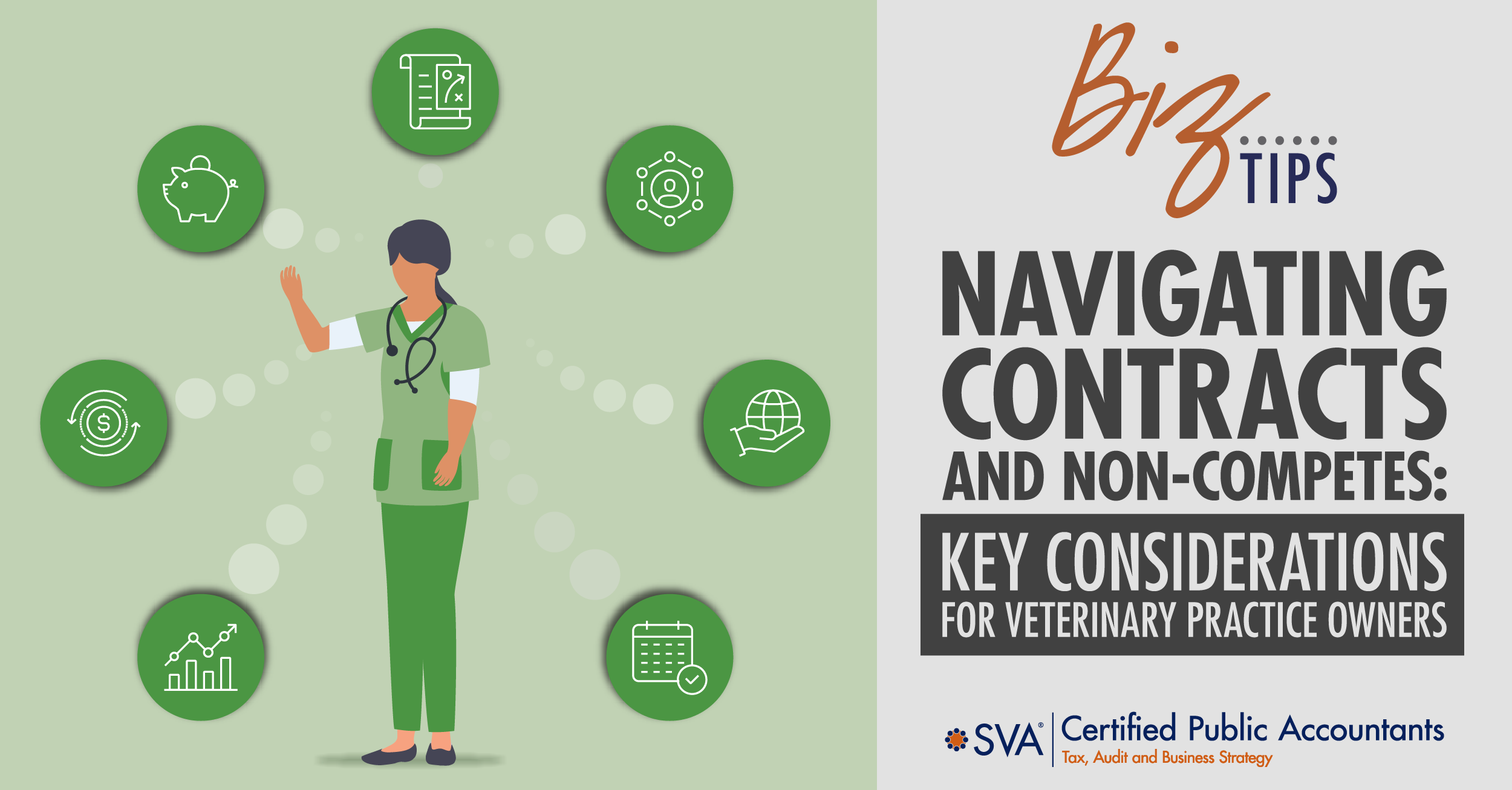| Highlights: |
- Summarizes key contractual elements veterinary practice owners should include—such as employment terms, compensation, benefits, and dispute resolution—to protect their business.
- Explains current non-compete and restrictive covenant issues (including FTC rule developments and state law like Wisconsin’s approach) impacting non-compete enforceability.
- Advises on additional protections (non-solicitation, non-disclosure) and structuring incentives such as bonuses and mentorship to attract and retain veterinary talent.
|
Veterinary practice owners face a unique set of challenges when it comes to employment agreements and protecting their businesses from competitive risks. With recent changes in non-compete regulations and the complexities surrounding restrictive covenants, crafting clear, fair, and compliant contracts benefits both the practice and the employee.
Below, we explore the key elements veterinary practice owners should keep in mind when drafting contracts and restrictive covenants.
The FTC's Final Non-Compete Rule and Its Implications
In April 2024, the Federal Trade Commission (FTC) issued a final rule that aimed to prohibit employers from entering into or enforcing non-compete clauses with employees. This was intended to give workers more freedom to seek employment and start their own businesses without the threat of legal action.
The rule, originally set to take effect in September 2024, included exceptions for senior executives earning over $151,164 annually or agreements made during the sale of a business.
However, a federal court in Texas issued an injunction in August 2024, effectively halting the rule’s implementation nationwide. The FTC is likely to appeal, but it could take years before the rule is fully resolved. In the meantime, state laws still govern non-compete agreements, making it essential for veterinary practice owners to understand their local regulations.
Understanding Restrictive Covenants in Wisconsin and Beyond
In states like Wisconsin, restrictive covenants are governed by state laws, such as Wisconsin Statute 103.465, which was enacted in 1957. This law makes non-compete agreements enforceable only if they are reasonably necessary to protect the employer and if the restrictions are limited in terms of geography and duration.
For Wisconsin employers, non-competes must be carefully written. If any part of the agreement is deemed unreasonable, the entire contract can be invalidated by the courts. Unlike some states that allow “blue penciling” (where a court can revise a contract to make it enforceable), Wisconsin courts adhere to an all-or-nothing approach.
Types of Restrictive Covenants to Consider
Restrictive covenants go beyond just non-compete agreements. Veterinary practice owners should also consider including the following:
| Non-Solicitation of Clients/Customers |
Prevents a departing employee from poaching clients. |
| Non-Solicitation of Employees |
Stops former employees from recruiting current staff to join them at a competing practice. |
| Non-Disclosure |
Ensures confidential information, including client data and trade secrets, is protected. |
Each of these agreements serve a different purpose, but collectively, they help safeguard the business against competitive threats when an employee moves on.
Essential Elements of Veterinary Employment Contracts
For veterinary practices, employment contracts should be comprehensive and address the specific needs of the practice and the employee. Key components to include are:
| Employment Status |
Whether the veterinarian is full-time or part-time, and their general duties. |
| Salary and Compensation |
Base salary, bonuses, or production-based pay (i.e., a percentage of revenue generated). |
| Benefits |
Health insurance, retirement plans, paid time off, and continuing education reimbursement. |
| Job Description and Responsibilities |
A clear outline of expectations, including on-call duties, weekend work, and emergency responsibilities. |
| Work Schedule and Location |
Specify the hours, locations (especially if the vet will work across multiple clinics), and travel requirements for mobile services. |
A well-structured contract provides clarity for both the practice owner and the employee, minimizing misunderstandings and potential disputes.
Sign-On Bonuses and Loan Repayment Incentives
In today’s competitive job market, offering sign-on bonuses or student loan repayment assistance is increasingly common. However, these benefits should come with conditions.
For example, if the veterinarian leaves before a set period, they may be required to repay a portion of the bonus or loan assistance. This ensures that practice owners get a return on their investment in new hires.
The Importance of Mentorship Programs
Veterinary professionals, especially those early in their careers, often seek out mentorship programs. Offering structured mentorship is not only beneficial for the mentee but also helps improve job satisfaction, reduce burnout, and foster a positive workplace culture.
A formal mentorship program should clearly define the expectations for both parties, including the time commitment and topics covered (e.g., medical skills, client communication, or business management). Establishing clear goals and tracking progress over time can ensure the program’s success and strengthen the relationship between mentors and mentees.
Leadership and Partnership Opportunities
For veterinarians looking to grow within a practice, contracts should detail opportunities for leadership roles or eventual ownership. This might include pathways for buying into the practice, partnership agreements, and internal leadership positions such as clinical directorships.
Outlining these opportunities early in the employment relationship not only helps attract ambitious veterinarians but also secures a longer-term commitment to the practice.
Handling Disputes: Arbitration and Mediation
Conflicts can arise in any workplace, so it’s important for your employment contracts to include a clear process for handling disputes. Whether you prefer arbitration, mediation, or litigation, specifying how conflicts will be resolved protects both the employer and the employee.
Additionally, the contract should identify which state’s laws will govern the agreement, especially if the practice operates across multiple states.
Termination Clauses and Notice Periods
Veterinary employment contracts should clearly define the conditions under which an agreement can be terminated. This includes both “for cause” scenarios (such as misconduct or breach of contract) and “without cause” situations (such as financial reasons).
The notice period required for termination or resignation should also be specified, with timelines ranging from two weeks to 90 days, depending on the employee’s role.
Ensuring Fairness and Compliance
Fairness and compliance should be at the forefront when creating employment contracts and restrictive covenants. It’s important to balance the needs of the practice with the rights of the employee, so that restrictive covenants are reasonable and employment terms are clear.
Staying up to date on state and federal laws will help ensure that your contracts are enforceable and protect your business for the long term.
© 2024 SVA Certified Public Accountants

